Many people still think that Linux is for tech experts or programmers. In reality, the Linux operating system changed drastically over the last decade and is available for all users. The Linux OS market is predicted to surpass $21 billion by 2030, growing by 17.93% annually.
It’s hard to estimate the overall number of Linux users because the system is free to use. As most commercially available devices come with pre-installed Windows or macOS, the number may be relatively low, but the statistic that Linux powers 96.3% of top web servers speaks for itself.
There would be no Internet as we know it without Linux. Below you will find crucial Linux advantages that many people can benefit from.
1. Revive Your Old Device
By now, many people have gathered a healthy amount of old laptops and Pentium dual-core desktops, needlessly gathering dust in the basement. You will not run Windows 10 on them, and Microsoft regularly cuts support for older versions.
Linux is an extremely resource-friendly OS that can easily run on an older device. Moreover, with the rise of cloud-based services, many people no longer need powerful devices. For example, the limited storage space of old computers is solved by Cloud storage providers that increase storage space without limits.
If you need a device solely to browse the Internet, install Linux on your 10-year-old device instead of spending additionally. Because Linux is way more secure than other operating systems, you will also minimize the chances of damaging more expensive machinery.
2. It’s Excellent for Beginners
We’ve got so used to macOS or Windows that people rarely consider there are better options. Of course, Windows is probably one of the better systems for gaming, and nothing shows you have extra cash like Mac. But what if you don’t want to experience occasional system crashes and would like to spend your money elsewhere?
Linux is the most stable OS that costs nothing. It’s an open-source system, meaning that technology experts worldwide can secure and improve it, and they do so successfully.
Numerous Linux distributions like Ubuntu (paid), Linux Mint (free), MX Linux (free), and others are user-friendly and perfectly suited for beginners. You can also customize some to look like Windows if you’re too used to it. In other words, you can get a more stable system and make it look however you want for free.
3. Cybersecurity Enthusiasts
According to Fortune, cybersecurity specialists are in huge demand, with 715,000 open jobs in the U.S. in 2021. Because the cybercrime situation actually worsened, it’s safe to assume there are enough positions to hire anyone who shows interest, dedication… and knows how to use Linux.
For example, the Kali Linux distribution is widely used for exhaustive vulnerability assessment and penetration testing. Moreover, Linux is used on various network devices and applications, like routers, intrusion protection systems, wireless access points, and more. Using a VPN service while working with Linux can provide an extra layer of security and privacy for those concerned about online privacy and dealing with extremely sensitive information. Of course, some CySec positions can avoid Linux, but you will undoubtedly meet this OS climbing higher up the ladder.
4. Developers
Although the statistics are hard to verify, it’s been stated that one-quarter of software engineers use Linux as their primary operating system.
Firstly, Linux is open-sourced, which means that anyone can contribute. You get a secure, stable, and free operating system, and you can become a part of it. Because Linux powers so many servers (Amazon, Dell, and IBM all use it), Linux developers are in high demand.
Linux provides much more control and customization options than any other operating system. Because it’s fast and resource-friendly, many programmers choose it for efficiency reasons. Furthermore, Linux can run on phones, smart TVs, and even supercomputers, which makes it applicable to different programming disciplines.
Still Not Convinced?
If you are still having doubts about this OS, below you will find additional benefits Linux users enjoy:
- Heavily documented. Linux has an active and involved community eager to share its knowledge online. If you want to learn how to use this system, you will find in-depth documentation, online support, and developers willing to teach you the ins and outs.
- Easy updates. Linux manages updates in a different way than Windows or macOS. Instead of updating each application separately and forcing a reboot, it uses update repositories that are more efficient and do not ask to restart the device afterward.
- Video games. You will not be able to run all games on Linux, but some distributions are gaming-friendly. Furthermore, those games will run on a more stable and resource-friendly operating free system, and if you don’t have a powerful computer, this can still give you a chance to play them. Moreover, you can run some terminal-based games on Linux to satisfy that nostalgia.
Conclusion
Linux is an excellent free, open-source operating system fit for many. Many myths surround it, but you can dispel most of them with many different distributions available. Of course, there are valid reasons why other operating systems have more users, but they should not hold you back from trying Linux.




